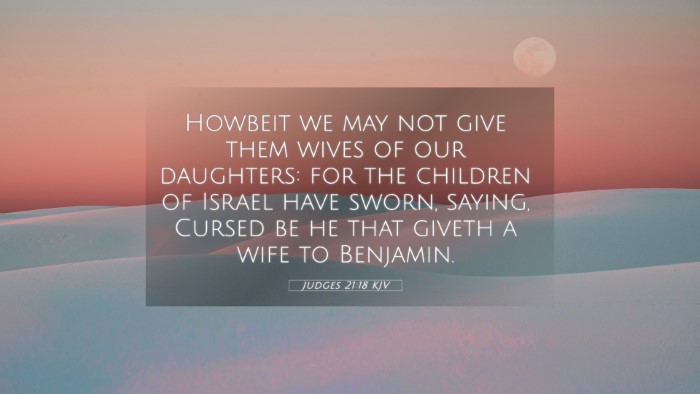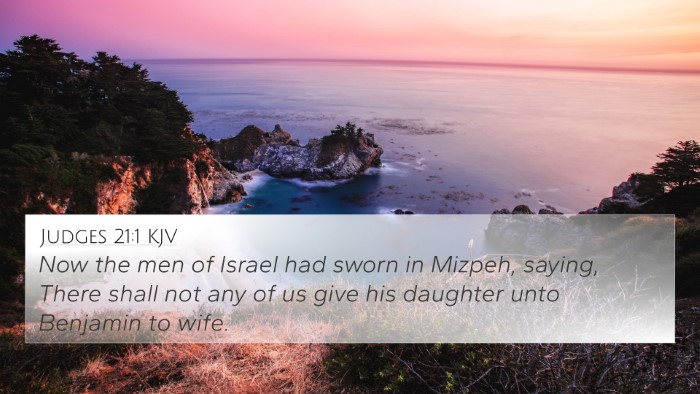Bible Verse Meaning: Judges 21:18
Judges 21:18 states: "Yet they said, 'There is no man of Benjamin here that can give them a wife; for we have sworn by the Lord that we will not give them our daughters to wives.'" This verse emerges from a complex narrative involving the tribe of Benjamin and the consequences of conflict among the Israelite tribes.
Summary of Insights from Commentaries:
Contextual Understanding:
As highlighted by Matthew Henry, this verse encapsulates the desperate situation following a civil strife against the Benjamites. The Israelites found themselves in a moral quandary, having made an oath not to provide their daughters to the remaining men of Benjamin, who were facing extinction following a severe conflict.
Thematic Insights:
Albert Barnes elaborates on the themes of commitment, oaths, and the resulting implications of such promises. The verse illustrates how maintaining one's vows can lead to difficult predicaments; the Israelites wished to aid the Benjamites yet felt constrained by their own legal and moral commitments.
Cultural Context:
Adam Clarke emphasizes the cultural practices among the Israelites. During this period, marriages were crucial for lineage and tribal alliances. The prohibition to intermarry with the Benjamites reflected both a societal norm and a spiritual condition, indicating a fracture within Israel's unity.
Cross-Referencing Biblical Texts:
Judges 21:18 connects to several other scriptures, showcasing a rich intertextual dialogue:
- Genesis 24:3-4 - Abraham's instructions to find a wife for Isaac, highlighting the importance of preserving lineage.
- Deuteronomy 7:3-4 - God's commandment against intermarriage with foreign nations, mirroring the Israelites' situation.
- 1 Samuel 8:5 - The demand for a king reflects the Israelites' desire for unity and leadership amid division.
- Romans 1:28-32 - A New Testament parallel showing the moral decline reminiscent of Israel's disobedience.
- Hosea 4:6 - God's judgment due to ignorance of dedication to His commands, relating to Israel's oath predicament.
- Joshua 9:18 - The consequences of oaths and treaties made by Israel and their obligations.
- Matthew 5:33-37 - Jesus’ teaching on oaths emphasizes the importance of integrity in promises.
- Philippians 3:2 - A New Testament warning against divisions and factions within a community.
- Ecclesiastes 5:4-5 - Advises against making vows lightly, relating to the consequences seen in Judges.
- Galatians 6:7 - The principle of reaping what one sows applies to the moral implications of the Israelites' actions.
Lessons and Applications:
The narrative surrounding Judges 21:18 serves not only as a historical record but also a moral lesson on the importance of integrity in commitments. The repercussions of hastily made promises can resonate through generations, and understanding this dynamic provides clarity in how we relate to both God and one another.
This story urges readers to consider the weight of their words and the implications of their choices, especially when they align with divine commands. Matthew Henry succinctly notes that God's people must honor their vows, as the ramifications are profound and far-reaching.
Keywords and Phrases:
- Bible verse cross-references
- Connections between Bible verses
- Linking Bible scriptures
- Comparative Bible verse analysis
- Bible verses that relate to each other
- Cross-referencing Biblical texts
- Thematic Bible verse connections
- Bible verse parallels
- Scriptural cross-referencing
- Inter-Biblical dialogue
Conclusion:
In conclusion, Judges 21:18 provides profound insights into the complexities of human relationships, divine commandments, and ethical decision-making. It underscores the importance of inter-Biblical dialogue, encouraging a thorough exploration of various scriptures for deeper understanding. As readers engage with this verse and its connections, they are invited to reflect on the overarching themes of loyalty, consequence, and spiritual integrity within the Biblical narrative.




